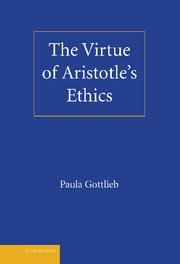Book contents
- Frontmatter
- Contents
- Preface and Acknowledgments
- Abbreviations
- Introduction
- PART I ETHICAL VIRTUE
- PART II ETHICAL REASONING
- 6 Moral Dilemmas
- 7 Fine Motivation
- 8 The Practical Syllogism
- 9 What the Good Person Has to Know
- 10 A Polis for Aristotle's Virtues
- Conclusion
- Appendix: Uniting the “Large-scale” Virtues
- Select Bibliography
- Index
7 - Fine Motivation
Published online by Cambridge University Press: 29 September 2009
- Frontmatter
- Contents
- Preface and Acknowledgments
- Abbreviations
- Introduction
- PART I ETHICAL VIRTUE
- PART II ETHICAL REASONING
- 6 Moral Dilemmas
- 7 Fine Motivation
- 8 The Practical Syllogism
- 9 What the Good Person Has to Know
- 10 A Polis for Aristotle's Virtues
- Conclusion
- Appendix: Uniting the “Large-scale” Virtues
- Select Bibliography
- Index
Summary
The point of this chapter is to present an account of the good human being's motivation, including the way in which the good human being is motivated to care for her friends, that is conducive to Aristotle's ethic of virtue and is consistent with Aristotle's claim, discussed in Chapter 5, that ethical virtue involves and is not merely in accordance with reason. According to Aristotle, the virtuous person is distinguished by the fact that he acts for the sake of the fine. Any account of Aristotle's ethics as an ethic of virtue will therefore have to explain what this means, because the locution is obscure. Modern commentators often connect it with Aristotle's view that the good person does the right thing, for example, the generous action or the brave deed, for its own sake, but the locution “for its own sake” has proved just as puzzling, since, according to Aristotle, something can be chosen both for its own sake and for the sake of something else.
I first show how Aristotle's view is plausible by comparing it with Plato's views. Next, I discuss and raise difficulties for Kantian and Utilitarian interpretations of Aristotle's view. This is important if Aristotle's views are to belong to the genre of virtue ethics that is distinct from Kant or Utilitarianism. I conclude that choosing x for its own sake and for the sake of y makes sense taken at face value, provided that y does not undermine one's choosing x in the first place.
- Type
- Chapter
- Information
- The Virtue of Aristotle's Ethics , pp. 134 - 150Publisher: Cambridge University PressPrint publication year: 2009



